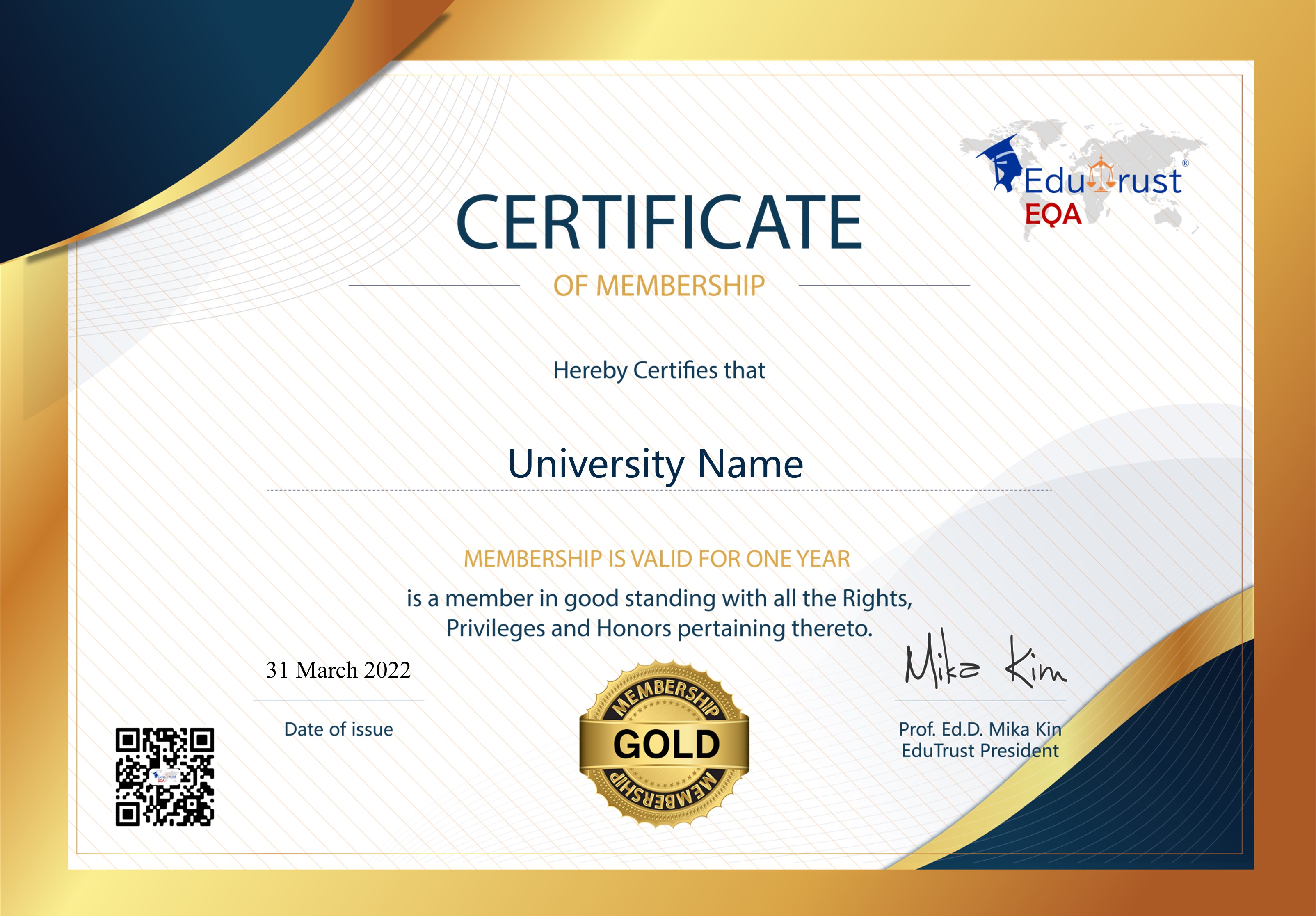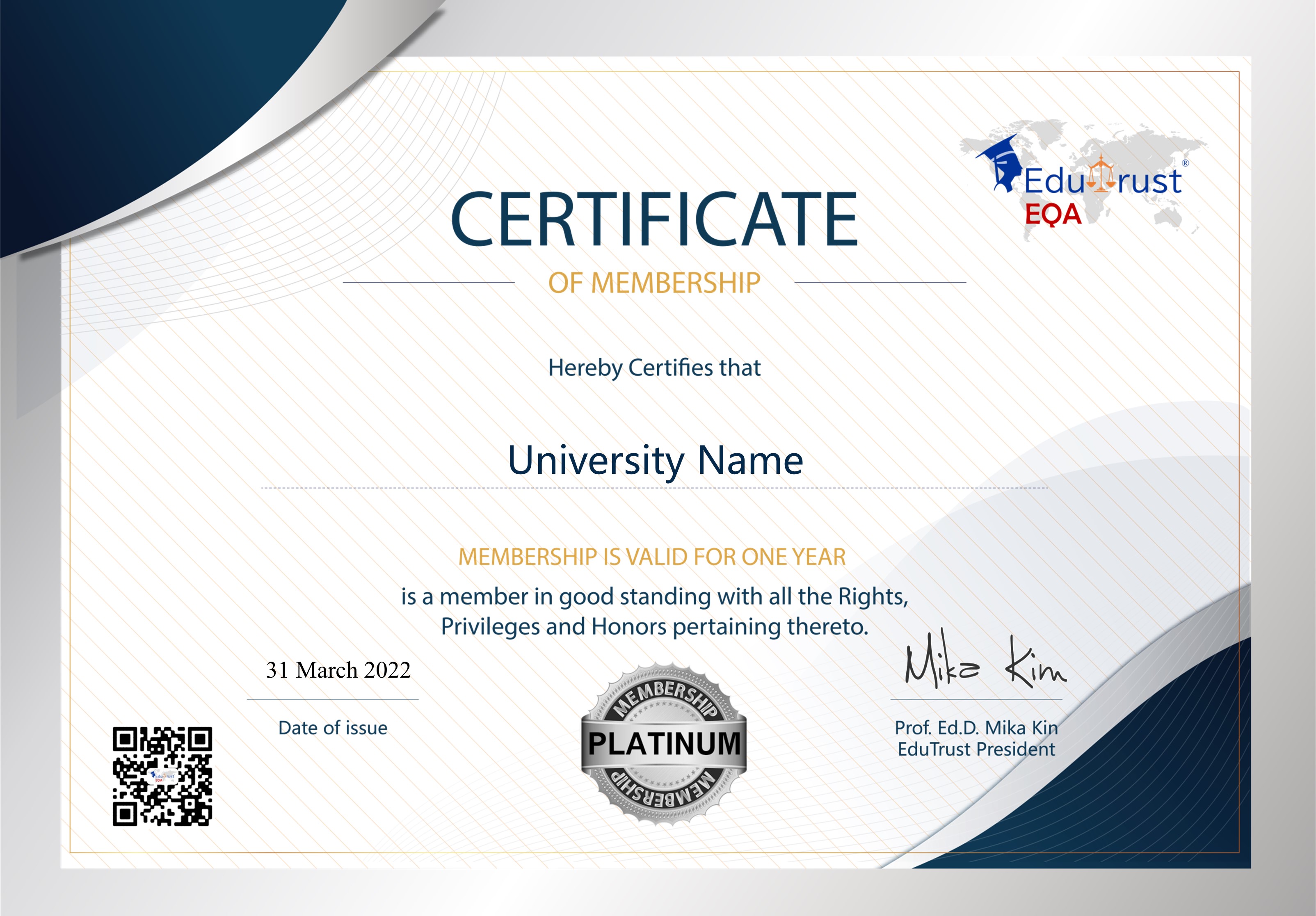About Accreditation
About Accreditation
Accreditation is a voluntary activity initiated by the institution that requires a rigorous self-evaluation and an independent, objective appraisal of the overall educational quality by peers. Accreditation emphasizes quality assurance and a commitment to continuous quality enhancement.
To achieve accreditation by EEQA, an institution must:
If judged to be in compliance with established standards, accreditation may be granted for a specific period, ranging from three to six years.
NATIONAL OR REGIONAL ACCREDITATION
National or State licensing agencies, higher education commissions, and other bureaus for private postsecondary education grant institutions the authority to operate in their states. EEQA cooperates with the states by considering for accreditation only those institutions which are licensed by the states. EEQA also keeps the states informed of accreditation activities affecting the institutions in their states.
ACCREDITATION FOR INTERNATIONAL EDUCATION INSTITUTIONS
EEQA also provides comprehensive academic certification to non-US universities, colleges, education companies, and training institutions.
Accreditation is the review of the quality of education offered by an institution or program. In the United States, accreditation is the primary way that students, families, the public, and government officials know that an institution provides a quality education. Accreditors, such as the DEAC, are private, non-governmental organizations created for the purpose of establishing standards of accreditation and reviewing institutions and programs against these standards. Each accrediting organization has bylaws or a constitution that describes the legal framework for its activities and operations.
The accreditation process entails
the preparation of a self-evaluation report – a detailed examination of how the institution meets accreditation standards and policies
a team visit and report prepared by a team of education administrators, faculty, and practitioners with specialized expertise who determine whether or not accreditation standards are being met
a final review and accreditation decision made by the accreditor's decision-making council or commission. The Commission members typically include education administrators, faculty, members of the public and other experts in the education field.
Accreditation Standards – requirements accreditors establish in areas that include academic quality, curriculum requirements, faculty, student services, ethical business practice, academic support services, learning and research resources, administrative capacity and financial capacity. These standards are developed by the accreditor in consultation with the institutions, faculty, students, administrators and members of the public.
Accreditation Policies – set forth descriptions of the functions and activities of the accrediting organization. Policies typically describe the process of accreditation, substantive changes, due process, appeals, information sharing and conflict of interest. Policies are also developed in consultation with institutions and the public.
More information on the EEQA accreditation process is located in the EEQA Accreditation Handbook.
Legal Notice and Disclaimer
EEQA grants accreditation to educational institutes, vocational institutions, distance learning centers, online courses, and corporations, and certification to professionals, qualified individuals, instructors, and students. EEQA can´t give any titles or degrees to the accredited institute´s students, or can´t give authorization about the diploma, work, opening an office, etc. Also, EEQA does not control or oversee the documents, certificates, diplomas, titles, degrees, rights, and authorizations issued (given) by the accredited institution. All rights and legal liabilities of these belong to the institution that carries out the transaction. EEQA periodically checks the educational quality of the institution and the up-to-dateness of the curriculum of the course/program and reports to the relevant institution.
Benefits of the Accreditation from EEQA:
Improvement.
The accredited member institution going through the self assessment process guided by The EduTrust Educational Quality Accreditation Association (EEQA) standards will learn how to further enhance its educational quality, how to improve its internal and administrative processes and how to optimize its overall outcome.
Recognition.
Each The EduTrust Educational Quality Accreditation Association (EEQA) accredited member institution will receive a recognition diploma certifying the accreditation. This status may be permanently checked by any third party at the EEQA website.
Promotion.
The Education Quality Accreditation Commission will promote its accredited members through the Internet and will forward any request to the appropriate institution. The Education Quality Accreditation Commission will finally reinforce the decision process of some potential students by emailing verification of the accreditation status of its members to any questioner.
Networking.
All the EEQA accredited member institutions aim towards a similar quality and long terms goals despite of their country of origin. This goal is reassured by the EEQA accreditation they share. This fact facilitates the establishment of diverse types of international cooperation and agreements among member institutions, such as learning from other colleagues around the world, establishing academic synergies, creating cooperative global market strategies, etc...
Quality Control.
The EduTrust Educational Quality Accreditation Association (EEQA) accreditation does not only provide a warranty of academic quality, educational integrity and administrative responsibility of the accredited institutions, but also ensures a continuous quality monitoring and feedback. The EEQA welcomes complains, suggestions and comments related to any member institution. These comments may provide a useful and quick feedback to the institution about any academic or marketing actions it conducts. Comments are also efficient to help the institution in detecting problems as well as to monitor that EEQA standards are respected.
Conflict Resolution.
The EduTrust Educational Quality Accreditation Association (EEQA) may intervene in several ways in the resolution of conflict within the different layers of the accredited institution. The EEQA may arbitrate disputes between members and/or students. The EEQA may guide and support the institution during periods of serious difficulty, potential liability, insecurity of continuation and even possible shut down. The EduTrust Educational Quality Accreditation Association (EEQA) advice will be always aimed to preserve the student welfare.


Sample Certificate
![]()